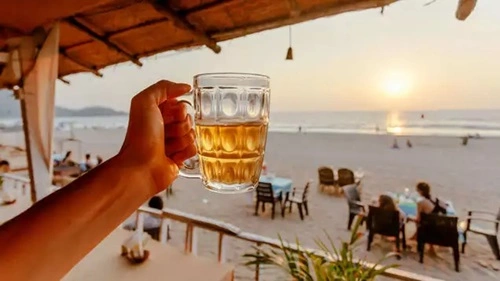Yes, in many cases, it is illegal to have alcohol on the beach, but the legality varies depending on the beach’s location and the governing regulations. While some beaches permit alcohol consumption in designated areas or with a permit, others enforce strict bans to ensure public safety and maintain cleanliness.
Understanding Alcohol Laws on Beaches
Beach alcohol regulations are governed by state laws, local ordinances, and the policies of specific parks or recreational areas. These rules aim to strike a balance between public enjoyment and safety, particularly in crowded or environmentally sensitive locations.
1. Beaches Where Alcohol Is Allowed
Designated Alcohol-Friendly Beaches
Some beaches in the United States permit alcohol consumption, either outright or under specific conditions. Examples include:
- Panama City Beach, Florida: Alcohol is allowed on the beach except during the month of March, when it is prohibited to prevent spring break-related issues.
- Carmel Beach, California: Alcohol is allowed on the beach, but only before 10 PM, and glass containers are strictly prohibited.
- South Padre Island, Texas: Alcohol is permitted, but local ordinances may impose restrictions during peak tourist seasons.
Special Permits
Some beaches allow alcohol if visitors obtain a permit for events such as parties or weddings. For example, in certain areas of Hawaii, alcohol is permitted with a special event permit.
2. Beaches Where Alcohol Is Prohibited
General Bans
Many beaches have outright bans on alcohol to prevent issues such as littering, intoxicated behavior, and harm to wildlife. Examples include:
- Myrtle Beach, South Carolina: Alcohol is prohibited on the beach, with strict enforcement of fines for violators.
- Miami Beach, Florida: Alcohol consumption is banned on public beaches, though exceptions may apply for certain events.
- California State Beaches: Alcohol is prohibited on many state-controlled beaches, such as those in San Diego County, without a permit.
Seasonal or Temporary Restrictions
Some beaches impose seasonal bans to address crowd control during busy periods, such as spring break or holidays. Local governments often implement these restrictions to reduce public disturbances and environmental impact.
3. Penalties for Violating Alcohol Laws on Beaches
The consequences of consuming alcohol on a beach where it is prohibited vary depending on the location and severity of the offense. Common penalties include:
- Fines: Violators may face fines ranging from $50 to $500.
- Eviction: Law enforcement may ask individuals to leave the beach.
- Confiscation: Alcohol may be confiscated by authorities.
- Arrest: Persistent or aggressive behavior while violating alcohol laws could result in arrest or misdemeanor charges.
4. Reasons Behind Alcohol Restrictions
Public Safety
Alcohol consumption can contribute to reckless behavior, increased drownings, and accidents, especially in high-traffic beach areas.
Environmental Protection
Broken glass and discarded cans pose risks to wildlife and visitors. Alcohol restrictions help reduce littering and environmental damage.
Crowd Control
Banning alcohol during peak times helps maintain order on crowded beaches and prevents unruly behavior associated with large gatherings.
5. Tips for Alcohol Consumption at Beaches
If you plan to bring alcohol to a beach where it’s permitted:
- Check Local Rules: Always verify the specific regulations for the beach you’re visiting.
- Avoid Glass Containers: Use plastic or aluminum to prevent accidents and comply with safety regulations.
- Drink Responsibly: Avoid excessive drinking to ensure your safety and the safety of others.
- Clean Up: Dispose of all trash properly to protect the environment.
Recent Legal Updates (2023-2024)
1. Increased Enforcement
Cities like Miami Beach and Santa Monica have increased patrols and implemented stricter enforcement of alcohol bans to address growing concerns over beach safety and environmental impact.
2. Expanded Alcohol-Friendly Areas
Some locations, like South Padre Island, have designated alcohol-friendly zones to balance public enjoyment with safety concerns.
3. Awareness Campaigns
Local governments and tourism boards are launching campaigns to educate beachgoers about alcohol regulations and the importance of respecting public spaces.
FAQs About Having Alcohol on the Beach
Q1. Is it illegal to have alcohol on the beach?
Ans: It depends on the location. Some beaches allow alcohol, while others enforce strict bans.
Q2. Are there exceptions to alcohol bans on beaches?
Ans: Yes, certain beaches allow alcohol with permits for special events or in designated areas.
Q3. What are the penalties for drinking alcohol on a prohibited beach?
Ans: Penalties may include fines, confiscation of alcohol, eviction from the beach, or, in severe cases, arrest.
Q4. Can I drink alcohol on private beaches?
Ans: Yes, alcohol consumption is typically allowed on private beaches unless restricted by local ordinances.
Q5. How can I find out if alcohol is allowed on a specific beach?
Ans: Check local government websites, park service guidelines, or beach signage for rules regarding alcohol consumption.

